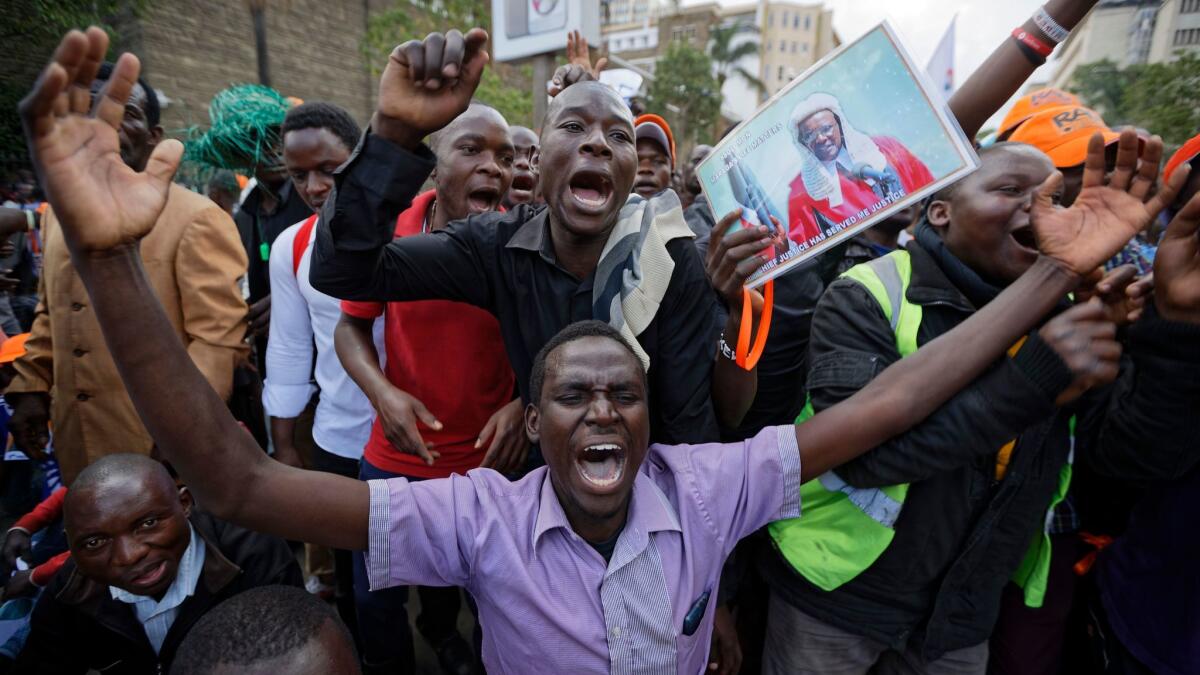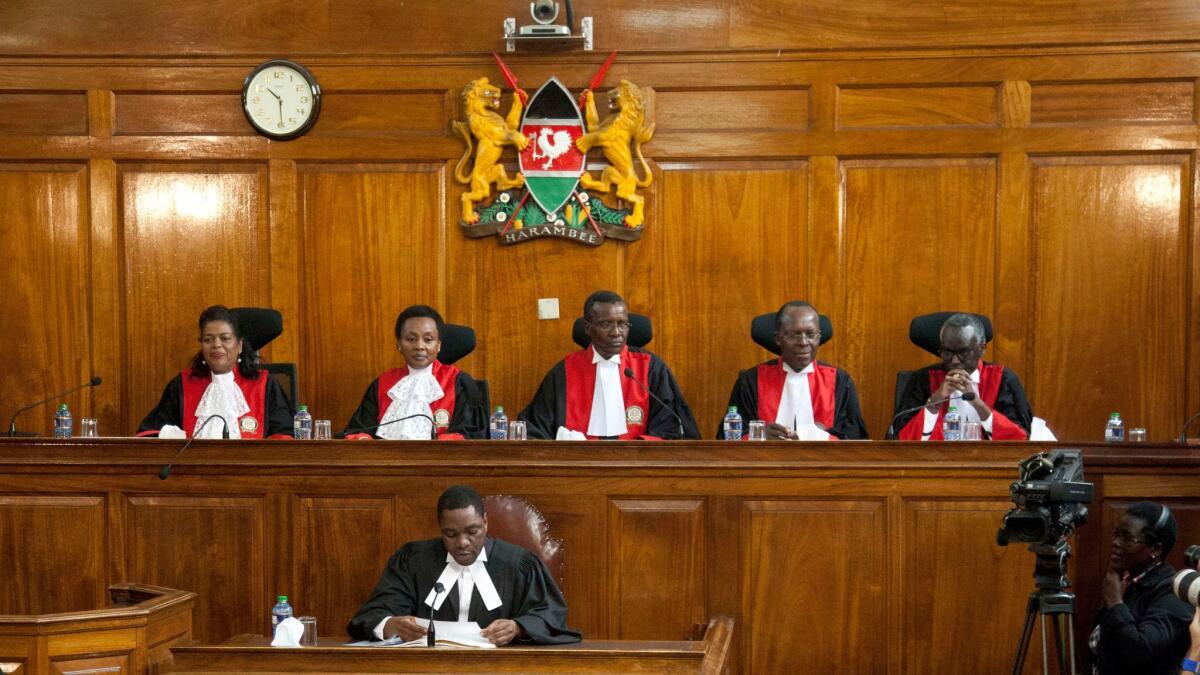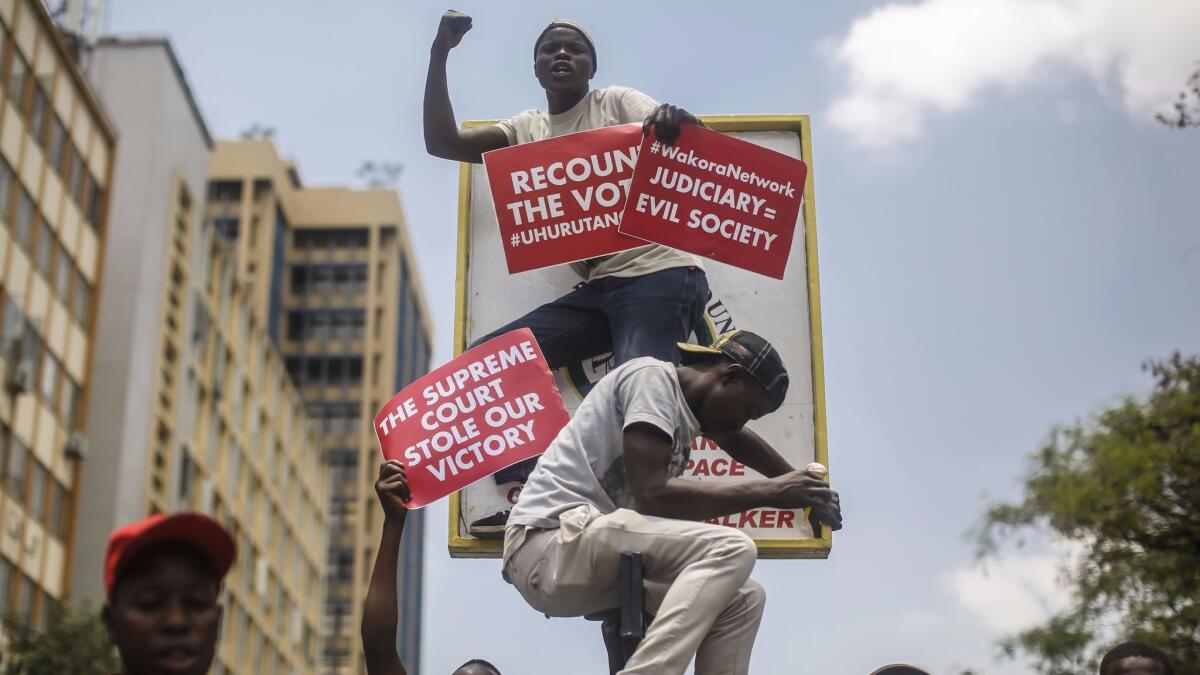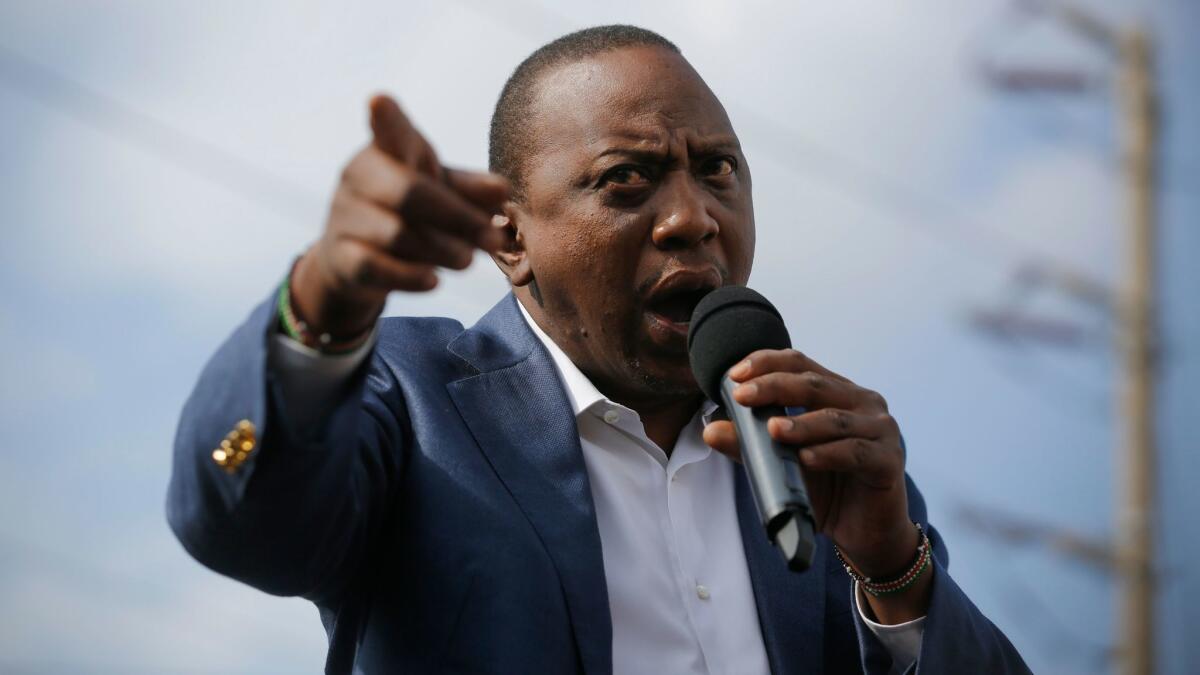After one failed election, can Kenyans come together to make the redo succeed?

After Kenya’s Supreme Court invalidated last month’s election because of mass irregularities, President Uhuru Kenyatta was angry and pained. It was as if a thief had stolen his cow and he couldn’t get it back, Kenyatta said last week.
He has declared that Kenya has “a problem” with the Supreme Court, calling the judges crooks who stole the election from him and threatening to “fix” the judiciary if he wins the redo election on Oct. 17. His lawyer has called the decision to overturn the election as “a judicial coup d’etat.”
Chief Justice David Maraga warned Tuesday that despite the increasingly aggressive threats against judges, Kenyan police had ignored requests to boost judges’ security.
The initial result gave Kenyatta, leader of the Jubilee governing alliance, a 1.4-million victory margin over Raila Odinga, a member of the NASA opposition alliance. But the court overturned the election because of irregularities and ordered a new vote next month.
It was a watershed moment for judicial independence on a continent where courts more often serve presidents like loyal retainers.

Kenya’s invalidated election: Incompetence or a conspiracy to steal the vote?
There were alarming signals that things were not right, even before the vote: A key election official, Chris Msando, in charge of the digital system and results transmission, was tortured and murdered days before the vote.
Days later, security services raided an opposition office and deported four information technology and election experts from the United States, Canada and Ghana who were hired by the opposition to help it track results and ensure there was no counting fraud.
Just after the vote, there was an attempt to hack into the electoral commission computers. Independent Electoral and Boundaries Commission Executive Officer Ezra Chiloba denied any hacking attempt, but was contradicted by his chairman, Wafula Chebukati, who confirmed there was an attempt, but that it failed.
Many vote tally forms lacked security features and the lack of opposition agents to sign off on results at many polling stations left open the possibility of manipulation.
Why did someone use the Kenyan electoral commissioner’s login … 9,943 times?
In an internal memo, Chebukati demanded that Chiloba “respond and explain” to 12 accusations of failures relating to the election.
The list of failures was eye-opening.
Many tally forms lacked security bar codes, stamps or signatures.
Three officials in the electoral commission created a user name and login in the name of Chebukati and used it 9,934 times without his knowledge.
The electronic transmission system failed in more than a quarter of the more than 40,000 polling booths. Backup satellite phones to allow transmission of results when mobile phone networks failed did not work. No one seemed to know if the printers and scanners were sent to every polling station or if they ever worked.
In a television interview, Chiloba said none of the problems compromised the integrity of the election.

Why did the court invalidate the election?
The Supreme Court delivered its reasons for the decision Wednesday. Deputy Chief Justice Philomena Mwilu said that Kenyans lost confidence in the election because of the confused and chaotic process of tallying and announcing the result.
She said the electoral commission announced the result before it received more than a quarter of the tally forms from polling stations, breaching the election law and the constitution. The commission also broke the law by failing to ensure that all polling stations had access to technology to transmit the results.
The tally of the result was not transparent or verifiable.
“We have no choice but to nullify it,” she said.
Chief Justice Maraga also found there was no reasonable explanation for the lack of security features or signatures or stamps on many polling station vote tally sheets, and that this undermined the election’s integrity.
When Justice Mwilu stumbled at times reading the judgment, Twitter flooded with posts from Kenyatta supporters accusing her of reading a script supplied by the opposition.
Maraga said the court’s power to overturn the election derived from the constitution and, ultimately, the Kenyan people, warning that ignoring the rule of law was a path to tyranny.
“The moment we ignore our constitution that Kenyans fought for for decades, we lose it,” he said during Wednesday’s judgment.

How can Kenya’s repeat election succeed, with both sides already crying foul?
As well as attacking the judiciary, President Kenyatta has threatened that his party would impeach Odinga, should the opposition leader win a repeat election.
Odinga, meanwhile, accuses officials of the electoral commission of stealing the vote and has called for them to be jailed.
The hopes for a successful repeat vote look dim, with whoever loses almost certain to go to court in protest, again.
European Union observers last week called on both parties to stop attacking the country’s independent institutions, amid fraying public trust.
Chief Justice Maraga said Wednesday that the electoral commission must conduct the new election according to the law, or the court would be forced to invalidate it again, in the event of a new challenge.
“The persistent criticism of the integrity and neutrality of state institutions has negatively affected confidence in the election,” the EU mission report found.
Twitter: @RobynDixon_LAT
Start your day right
Sign up for Essential California for news, features and recommendations from the L.A. Times and beyond in your inbox six days a week.
You may occasionally receive promotional content from the Los Angeles Times.



